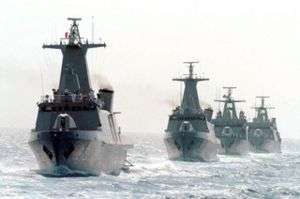Sierra-class corvette
 Four Sierra-class corvettes | |
| Class overview | |
|---|---|
| Name: | Sierra class |
| Builders: | Tampico Naval Shipyard and Salina Cruz Naval Shipyard |
| Operators: |
|
| Preceded by: | Holzinger class |
| Succeeded by: | Durango class |
| Planned: | 4 |
| Completed: | 4 |
| Active: | 3 |
| Lost: | 1 |
| General characteristics | |
| Type: | Offshore patrol vessel |
| Displacement: | 1,335 tons |
| Length: | 75 m (246 ft 0.8 in) |
| Propulsion: | 2 diesel Caterpillar 3616 V16 12,394 bhp (9,242 kW) |
| Speed: | 20 knots (37 km/h; 23 mph) |
| Range: | 3,830 nmi (7,090 km; 4,410 mi) at 18 kn (33 km/h; 21 mph) |
| Complement: | 74 |
| Sensors and processing systems: |
|
| Armament: | 1 Bofors 57 mm gun Mk 3 |
| Aircraft carried: | 1 x MBB Bo 105 |
| Aviation facilities: | One helicopter hangar and Helipad |
The Sierra-class corvettes are intended mainly for interception of drug smugglers, Exclusive Economic Zone (EEZ) patrol, and countering terrorism. The class comprises four ships with the lead ship ARM (Armada de la Republica Mexicana) Sierra (P-141) commissioned by the Mexican Navy in 2000.
Originally, this project was designated Holzinger 2000 because it is a further development of Mexican Navy Holzinger-class ships introduced in the early 1990s. These ships represent modern shipbuilding with an aft flight deck and hangar for one MBB BO-105C helicopter, stealth features and one 57-millimetre (2.2 in) Mk3 naval gun in the fore deck to engage air and surface targets.[1]
Ships
- ARM Sierra (P-141)
- ARM Juarez (P-142) - Taken out of service after a fire incident.[2]
- ARM Prieto (P-143)
- ARM Romero (P-144)
References
- Wertheim, E. (2007) Naval Institute Guide to Combat Fleets of the World: Their Ships, Aircraft, and Systems. 15 edition. US Naval Institute Press.
This article is issued from
Wikipedia.
The text is licensed under Creative Commons - Attribution - Sharealike.
Additional terms may apply for the media files.